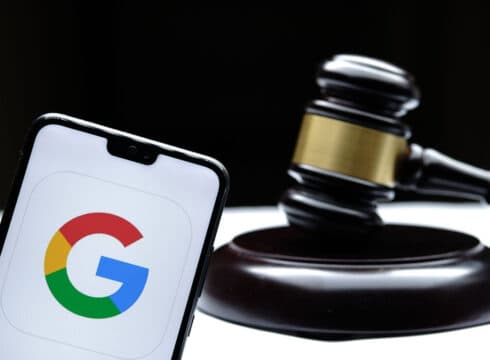Google reportedly noted that there were more than 50 instances of copypasting, ‘word-for-word’ in some cases
NCLAT is set to hear the tech giant’s appeal against the competition watchdog’s penalty today (January 4)
The CCI imposed a fine of INR 1,337.76 Cr on Google for exploiting its market dominance within the Android ecosystem
Inc42 Daily Brief
Stay Ahead With Daily News & Analysis on India’s Tech & Startup Economy
Google has told the National Company Law Appellate Tribunal (NCLAT) that the Competition Commission of India (CCI) copied parts of a European Union order against the US-based tech giant for abusing the market dominance of its Android operating system.
According to legal documents accessed by Reuters, Google has argued that the CCI penalty should be quashed, given the competition watchdog copied aspects of the European order. The report comes as the appeals tribunal is set to hear the tech giant’s appeal against the competition watchdog’s penalty today (January 4).
In its filing to NCLAT, Google argues the CCI copy-pasted extensively from a European Commission decision, deploying evidence from Europe that was not examined in India.
Google reportedly noted that there were more than 50 instances of copypasting, ‘word-for-word’ in some cases. The watchdog erroneously dismissed the issue, Google reportedly said in the filing mentioned by the publication.
“The Commission failed to conduct an impartial, balanced, and legally sound investigation … Google’s mobile app distribution practices are pro-competitive and not unfair/ exclusionary,” the filing read.
The CCI imposed a fine of INR 1,337.76 Cr ($161 Mn) on Google for exploiting its market dominance within the Android ecosystem, including areas such as online search and the Android app store. The competition watchdog also ordered Google to change the restrictions it imposed on smartphone makers regarding pre-installing apps.
After the penalty was imposed, Google said in a statement that the CCI order presents a major setback for its Indian users and businesses. It added that the changes proposed by the competition watchdog for issues such as sideloading might undermine the security of Indian devices.
Media reports from October, right after the CCI imposed the fine, mentioned that Google was worried about the decision as the remedies mentioned in the order were more sweeping than the 2018 order by the European Commission in a similar case.
It is interesting to note that the tech major has also challenged the $4.3 Bn fine imposed by the Commission as well. India is far from the only geography where Google has been facing antitrust scrutiny, with the EU and the US being other geographies where it is facing such action.
The problem arises from Google’s claim that Android is open source, which in theory should allow smartphone makers to do as they please as long as they have licenced the operating system. However, Google imposes several restrictions, including the need to install the Google Mobile Suite, a set of pre-installed apps which include Search, Gmail and YouTube.
This was the core of the CCI order in October, which noted that Google’s licensing of its Play Store “shall not be linked with the requirement of pre-installing” Search, Chrome, YouTube or any other Google apps. However, Google’s appeal noted that while the CCI only found antitrust issues in these areas, its order extends beyond that.
{{#name}}{{name}}{{/name}}{{^name}}-{{/name}}
{{#description}}{{description}}...{{/description}}{{^description}}-{{/description}}
Note: We at Inc42 take our ethics very seriously. More information about it can be found here.


